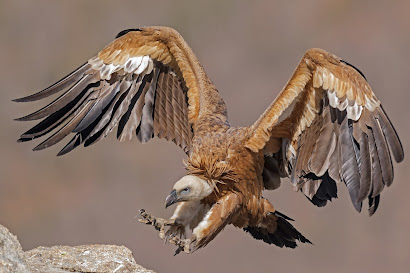Awkward and ungainly on the ground, vultures are graceful and elegant in the air, soaring beautifully in the sky. Vultures are scavengers of dead animals and are found on every continent except for Australia and Antarctica. There is even one, the mountain-dwelling bearded vulture that feeds on the bones. The stomachs of vultures are incredibly acidic and corrosive (pH=1.0; for humans, it is between 1.5 and 3.5), protecting them from potentially lethal toxins such as botulinum, hog cholera, and anthrax bacteria.
By removing dead carcasses of rotting animals, vultures play a vital role in preventing the spread of disease. However, their populations have declined dramatically due to human activity. Vultures in Asia have been particularly affected by the use of the veterinary drug, diclofenac. We need a better understanding of the conservation and role played by vultures in ecosystems. The benefits they provide far outweigh any potential threat through the spread of disease.
A new analysis published in IBIS, The International Journal of Avian Science, examines whether bacteria, viruses, and other microorganisms that are present in wild vultures cause disease in the birds, or whether vultures play a role in spreading or preventing infectious diseases to humans and other animal species.
The analysis examined results from published studies and found that microorganisms, which cause disease in humans, can be found in vultures with some bacterial pathogens showing multi-antibiotic resistance. In some cases, these microorganisms cause health alterations of a variable degree in different vulture species, but there was no clear evidence that vultures play a role in spreading pathogens to humans and other species. On the contrary, they may help to prevent the spread of infectious diseases when they consume and remove decomposing carcasses from the environment.
 |
| Image Credit: Jorge de la Cruz |
Lead author of the study, Pablo Plaza of the INIBIOMA-CONICET-National University of Comahue, in Argentina, says:
“Further research should evaluate the potential of vultures in disease regulation to avoid misconceptions and to promote scientific evidence of the ecosystem service they provide. This will help to conserve this globally threatened avian group and maintain the contributions they provide to people.”
The conservation status of vultures is of particular concern to humans. The decline of vulture populations can lead to increased disease transmission and resource damage from increased populations of disease vectors and pests that scavenge carcasses opportunistically. Vultures control these pests and disease vectors indirectly through competition for animal bodies. We need vultures.
Ray Noble is a chartered biologist and Fellow of the Royal Society of Biology. He writes extensively on the nature of intention and agency in living systems.
Comments
Post a Comment